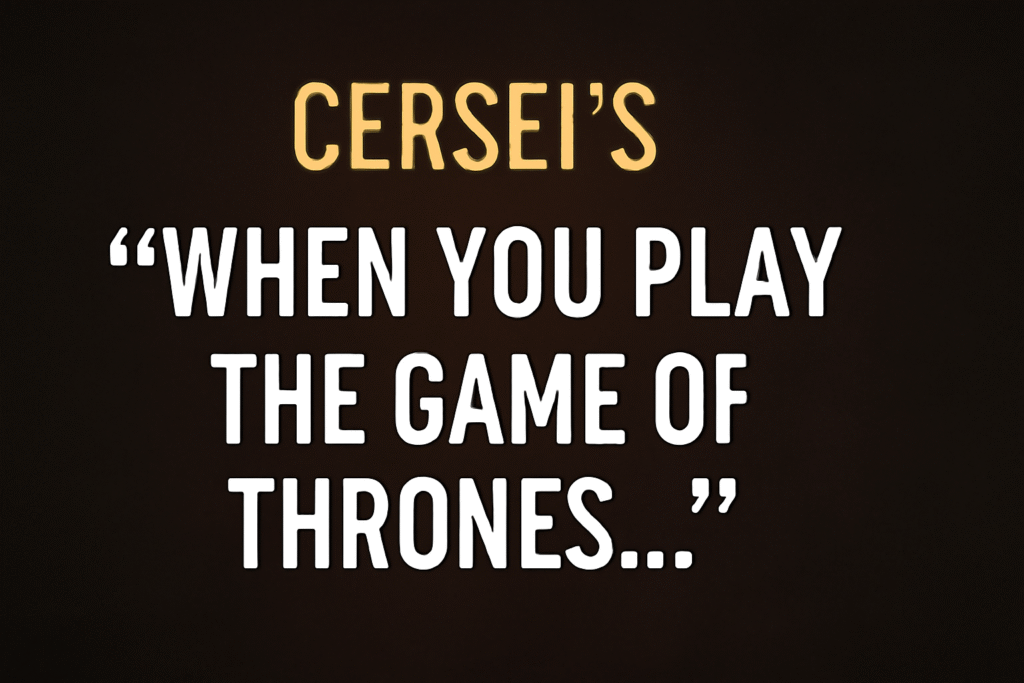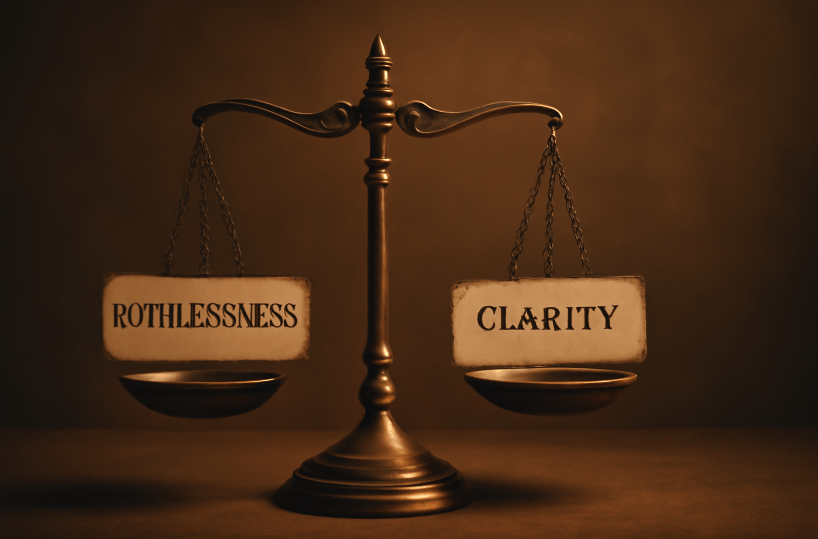
Cersei’s ‘When You Play the Game of Thrones…’ Quote Explained: What It Really Means About Power, Strategy, and Survival
That’s the brutal reality behind Cersei’s “When you play the game of thrones…” quote—one of the most iconic lines in the entire series. But here’s the thing: it’s not just a dramatic moment from a fantasy show. It’s a sharp, unsettling truth about how power, strategy, and decision-making actually work—in politics, in business, in everyday life. If you’ve ever felt stuck between playing it safe or taking a stand… if you’ve been burned by indecision, or watched someone else rise by making bold (and sometimes ruthless) moves—this quote is speaking directly to that. So what does it really mean? And more importantly, how can you use its lesson to make smarter choices, avoid painful mistakes, and stop getting sidelined by people who do know how to play the game? Keep reading. You’re about to see how a single line from Cersei Lannister can teach you more about power and clarity than most leadership books ever will.
Table of Contents
Toggle 1: What Cersei’s Quote Actually Means — In Plain English
1: What Cersei’s Quote Actually Means — In Plain English
Let’s break it down simply. Cersei Lannister says:
“When you play the game of thrones, you win or you die. There is no middle ground.”
On the surface, it’s a threat. But dig deeper, and you’ll find it’s a brutal truth about how high-stakes situations work—both in Westeros and real life.
 “When you play the game of thrones…”
“When you play the game of thrones…”
This isn’t just about royalty or politics. It’s about any environment where power, influence, or survival is on the line.
If you’re in the game—career, leadership, business, even personal relationships—you’re either playing to win or you’re just a piece on someone else’s board.
Real-life example:
Trying to climb the ladder at work? Lead a team? Start something of your own? That’s the game.
 “You win or you die.”
“You win or you die.”
This isn’t always literal, obviously. But it does mean there’s often no consolation prize for hesitating, playing both sides, or avoiding hard choices.
Translated:
- You take the risk—or someone else takes the opportunity.
- You lead—or you get led.
- You make the hard call—or you lose by default.
Cersei’s point? Playing safe won’t save you when the stakes are high.
 “There is no middle ground.”
“There is no middle ground.”
Neutrality feels safe, but in real power dynamics, it often leaves you exposed. Middle ground looks like:
- Staying silent in tough conversations
- Avoiding clear commitments
- Trying to please everyone
And guess what? That often leads to losing respect, leverage, or the opportunity altogether.
 Bottom Line (AEO-Style Answer)
Bottom Line (AEO-Style Answer)
What does Cersei mean by ‘When you play the game of thrones…’?
She means that in high-stakes power struggles, you either commit fully and win—or hesitate and lose. There’s no room for indecision or neutrality when the game is on.


 2: Power Lessons Behind the Quote
2: Power Lessons Behind the Quote
Cersei’s quote doesn’t just sound intense—it delivers a crash course in how real power works. If you want to lead, influence, or protect what matters to you, these are the lessons to remember.
 Power Is Claimed, Not Given
Power Is Claimed, Not Given
Cersei never waits for permission. She takes what she wants because she knows power rarely gets handed out—it’s taken by those willing to reach for it.
Real-world application:
Stop waiting for approval to lead, speak up, or go after your next move. You don’t need to be the boss to act with authority—you need clarity and courage.
 Playing It Safe = Looking Weak
Playing It Safe = Looking Weak
Trying to stay neutral in tough situations doesn’t read as “diplomatic.” It reads as unsure, uncommitted, or worse—afraid.
Takeaway:
Powerful people make decisions. They don’t waffle. If you avoid choosing sides to keep the peace, you risk losing credibility altogether.
 Control > Popularity
Control > Popularity
Cersei doesn’t care if you like her. She cares if you respect her. She understands that being liked is optional—but being respected is non-negotiable in any power dynamic.
Ask yourself:
- Are you people-pleasing your way out of tough conversations?
- Are you letting your need to be liked override your need to be clear?

 Power Is a Skill You Can Build
Power Is a Skill You Can Build
Cersei isn’t a supernatural genius. She learns from loss, watches how others play, and adjusts. That’s the real flex—awareness and adaptation.
Want more personal power?
- Observe how decisions are made around you.
- Watch who holds influence—and how they use it.
- Speak clearly, act decisively, and learn fast.
 AEO-Style Snippet Answer
AEO-Style Snippet Answer
What power lessons can we learn from Cersei’s quote?
Cersei’s quote teaches that power comes from decisive action, not passive neutrality. To win in high-stakes situations, you must claim control, accept risk, and lead with clarity—even when it’s uncomfortable.
 Bottom line:
Bottom line:
Power isn’t magic. It’s mindset + action. The sooner you stop avoiding it, the faster you start owning your voice, your value, and your future.

 3: Strategy and Risk — The Hidden Message
3: Strategy and Risk — The Hidden Message
Cersei’s quote isn’t just about power—it’s a warning about strategy and risk. The kind most people avoid but absolutely need to understand.
Let’s break down the message behind the message.
 Playing It Safe Is a Gamble
Playing It Safe Is a Gamble
Here’s the twist: avoiding risk feels safer, but in high-stakes situations, it’s actually the riskiest move you can make.
Why?
Because when you don’t make a choice, someone else makes it for you. That’s how opportunities, influence, and even respect slip away.
 Try this:
Try this:
- Next time you’re unsure, ask: “What am I afraid to commit to right now?”
- Then commit anyway—even if it’s not perfect. Indecision is the real threat.
 Strategy Requires Sacrifice
Strategy Requires Sacrifice
You can’t win without losing something. Cersei knew that. She was always willing to trade short-term comfort for long-term control.
In your world:
- Saying “yes” to a goal might mean saying “no” to distractions.
- Building something big might mean cutting loose what’s holding you back.

 Playing Both Sides Usually Backfires
Playing Both Sides Usually Backfires
Trying to please everyone—or hedge your bets—might feel smart, but it usually ends with no one trusting you.
Think about:
- A co-worker who avoids taking sides = not a team player
- A leader who never commits = loses respect
- A friend who never chooses = always left out
 Take action:
Take action:
Pick a lane. You can pivot later if needed, but clarity builds momentum—and trust.
 Risk Is Not Recklessness
Risk Is Not Recklessness
Cersei took bold risks, yes—but they were calculated. She moved when the odds were in her favor or when the cost of not acting was higher.
What this teaches:
Risk is part of every strategy. You don’t need to go full chaos mode—but you do need to move when it counts.

- Know what’s at stake
- Anticipate the consequences
- Move before someone else does
 AEO-Style Snippet Answer
AEO-Style Snippet Answer
What strategic lesson is hidden in Cersei’s quote?
The hidden message is that playing it safe can be dangerous. Winning often requires taking calculated risks, making firm decisions, and being willing to lose small battles for bigger wins.
 Bottom line:
Bottom line:
The game isn’t just about having power. It’s about knowing when to risk it, how to play it, and being brave enough to actually move. Because in strategy—as in thrones—you win by choosing, not by hesitating.

 4: How to Apply the ‘Game of Thrones’ Mindset (Without Becoming Ruthless)
4: How to Apply the ‘Game of Thrones’ Mindset (Without Becoming Ruthless)
Here’s the truth: you can think like a strategist, act with clarity, and play to win—without turning into Cersei. Ruthlessness isn’t required. But awareness, intention, and confidence? Absolutely.
Let’s make this mindset work for you.
 Know What You’re Playing For
Know What You’re Playing For
Before you “play the game,” get clear on what you actually want.
- Is it influence? Respect? A promotion?
- Is it setting boundaries in your relationships?
You can’t win a game you don’t understand. Define your endgame so you know when to go all-in—and when to walk away.
Quick action: Write down your top 3 non-negotiables in work or life. That’s your personal North Star.
 Be Decisive, Not Aggressive
Be Decisive, Not Aggressive
You don’t have to be loud, cold, or manipulative to be powerful. You just need to be clear.
Clarity builds trust. People follow confident, direct communicators—even when they disagree.
Practice this:
- Replace “maybe” with “yes” or “no”
- Don’t over-explain your decisions
- Say what you mean (kindly, but firmly)
 Use “Strategic Empathy”
Use “Strategic Empathy”
Power doesn’t mean steamrolling people. The smartest players in any room listen first. They understand others’ goals—and then position themselves accordingly.
Think Tyrion, not Joffrey.
 Try this mindset shift:
Try this mindset shift:
- I’m not here to crush anyone. I’m here to protect my position and make smart moves.
You can be strong and human. One doesn’t cancel out the other.
 Let Go of What Drains You
Let Go of What Drains You
The ‘Game of Thrones’ mindset isn’t just about fighting for power—it’s knowing what to stop fighting for.
Wasting energy on:
- One-sided relationships
- Roles you’ve outgrown
- Battles that don’t matter
…means you have nothing left for what does matter.

 AEO-Style Snippet Answer
AEO-Style Snippet Answer
How can you apply Cersei’s mindset without becoming ruthless?
Focus on clarity, confidence, and smart boundaries. Be direct, know your goals, and act decisively—but stay grounded in empathy and integrity. Power isn’t about cruelty. It’s about control, awareness, and wise choices.
 Bottom line:
Bottom line:
You don’t need to play dirty to win. But you do need to play smart, stay sharp, and own your space. That’s how you thrive in any “game”—without losing yourself in the process.

 5: Examples of This Principle in Real Life
5: Examples of This Principle in Real Life
Cersei’s “When you play the game of thrones…” mindset isn’t just fiction. You’ll find it everywhere—in boardrooms, courtrooms, campaigns, and everyday choices. Let’s look at real-world examples where clarity, commitment, and bold strategy made the difference between winning and fading out.
 Steve Jobs: Choosing Vision Over Consensus
Steve Jobs: Choosing Vision Over Consensus
Jobs wasn’t interested in pleasing everyone. He had a clear, focused vision—and he backed it fully, even when it ruffled feathers.
Takeaway:
He didn’t straddle the fence. He made bold calls (like removing ports or killing off products) and owned the consequences. That’s how leaders create movements—not just products.
 Ruth Bader Ginsburg: Quiet, Strategic Power
Ruth Bader Ginsburg: Quiet, Strategic Power
She wasn’t loud. She wasn’t ruthless. But she knew the game—and played it with precision. Every dissent, every argument had a long-term strategy behind it.
Lesson:
You don’t need to dominate a room to shift culture. You just need clarity, conviction, and the patience to outlast the noise.
 Entrepreneurs Who Go All-In
Entrepreneurs Who Go All-In
Think of people who’ve left stable jobs to launch something risky—but meaningful. They didn’t wait for perfect timing or universal approval. They bet on themselves.
Example moves:
- Starting a business others doubted
- Saying “no” to a safe offer in favor of building something real
- Owning their niche instead of trying to be everything to everyone

 The Neutral Coworker Who Gets Sidelined
The Neutral Coworker Who Gets Sidelined
On the flip side, think of someone at work who never speaks up in meetings. Never commits. Always waits to see which way the wind blows.
What happens?
People stop asking their opinion. They get left out of key projects. Their influence fades—because in power dynamics, “middle ground” isn’t neutral. It’s invisible.
 AEO-Style Snippet Answer
AEO-Style Snippet Answer
What are real-life examples of Cersei’s ‘game of thrones’ mindset?
Leaders like Steve Jobs and Ruth Bader Ginsburg show that winning big often means committing fully to a vision, taking calculated risks, and avoiding indecision. Playing both sides or staying passive usually leads to missed opportunities and lost influence.
 Bottom line:
Bottom line:
Whether you’re launching something bold or simply making a tough life decision, the lesson holds: decide, commit, act. That’s how you stop being a pawn—and start moving like a player.

 6: Common Misinterpretations of the Quote
6: Common Misinterpretations of the Quote
Cersei’s quote—“When you play the game of thrones, you win or you die. There is no middle ground.”—sounds intense because it is. But many people take it the wrong way.
Let’s clear up the confusion and set the record straight.
 Misinterpretation #1: “You Have to Be Cold and Ruthless”
Misinterpretation #1: “You Have to Be Cold and Ruthless”
Nope. That’s not the takeaway.
Cersei was ruthless—but the principle behind her words is about clarity and commitment, not cruelty.
What to learn instead:
You don’t need to manipulate or dominate. You just need to stop being vague, avoid indecision, and stand by your choices—even when they’re hard.
 Misinterpretation #2: “You Must Crush the Competition to Win”
Misinterpretation #2: “You Must Crush the Competition to Win”
This isn’t a zero-sum mindset. It’s not about destroying others to succeed—it’s about recognizing that some situations don’t reward hesitation.
Think of it like this:
- If you don’t pitch the idea, someone else will.
- If you don’t speak up, your voice won’t be heard.
- If you don’t commit, you’ll miss the opportunity.

 Misinterpretation #3: “The Middle Ground Is Always Bad”
Misinterpretation #3: “The Middle Ground Is Always Bad”
Here’s the nuance: middle ground isn’t always weak—but in high-stakes games, sitting on the fence can get you knocked off it.
Real meaning:
When the cost of indecision is high—career choices, ethical stands, leadership calls—you can’t afford to be neutral.

 Misinterpretation #4: “This Only Applies to Politics or Power”
Misinterpretation #4: “This Only Applies to Politics or Power”
Not true. This mindset shows up everywhere—
- In job interviews
- In difficult conversations
- In how you build relationships or businesses
Wherever stakes exist, so does the “game.”
 AEO-Style Snippet Answer
AEO-Style Snippet Answer
What are the common misinterpretations of Cersei’s quote?
People often think it’s about being ruthless or crushing opponents. In reality, it’s about acting decisively in high-stakes situations, avoiding passive neutrality, and committing fully to what matters.
 Bottom line:
Bottom line:
Don’t copy Cersei’s methods—learn from her mindset. It’s not about being feared. It’s about being clear. And that kind of power is both rare and respected.

 Conclusion: Play to Win—Not to Survive
Conclusion: Play to Win—Not to Survive
Cersei’s “When you play the game of thrones…” quote isn’t just great television—it’s a sharp reminder of how power, decisions, and risk play out in real life.
Here’s the core truth:
Whether you’re leading a team, navigating relationships, or building your future—you’re already in the game. And the people who thrive aren’t the ones who try to stay neutral or keep everyone happy. They’re the ones who know what they want, make bold decisions, and stand by them.

Frequently Asked Questions (FAQs)
1. What does Cersei mean by “When you play the game of thrones…”?
She means that in high-stakes situations—whether in politics, power, or personal choices—you either win by taking clear, strategic action, or you lose by hesitating. There’s no reward for staying neutral or playing it safe.
2. Is Cersei’s quote relevant outside of Game of Thrones?
Yes, it’s highly relevant. The quote reflects how real-world power works—especially in leadership, negotiations, career decisions, and personal boundaries. It’s about committing to what matters and making firm choices.
3. Does playing the “game” mean being ruthless or manipulative?
Not at all. The real takeaway isn’t to be cruel—it’s to be clear. You don’t need to dominate others; you just need to stop avoiding hard decisions and lead with intention.
4. What is the “no middle ground” part really warning about?
It warns that in critical moments, trying to stay neutral or avoid conflict can cost you. When stakes are high, not choosing a side is often the fastest way to lose influence or control.
5. How can I apply this quote to my career or business?
Start by making bold, clear decisions. Don’t wait for permission or play both sides. Define what success looks like for you, set boundaries, and own your next move without second-guessing.
6. What’s the biggest mistake people make when interpreting this quote?
Many think it’s about being heartless, but that’s a misread. The quote is about clarity, not cruelty. It’s a lesson in commitment, strategy, and avoiding the trap of indecision.
7. Are there real-world leaders who follow this mindset?
Absolutely. People like Steve Jobs, Ruth Bader Ginsburg, and bold entrepreneurs often lead with clear vision and decisive strategy—just like Cersei’s quote suggests (minus the backstabbing).
8. How do I develop the confidence to “play the game” without losing myself?
Start small: make faster decisions, say no to what drains you, and define your core values. Power doesn’t require harshness—it requires clarity, courage, and a willingness to stand firm.



